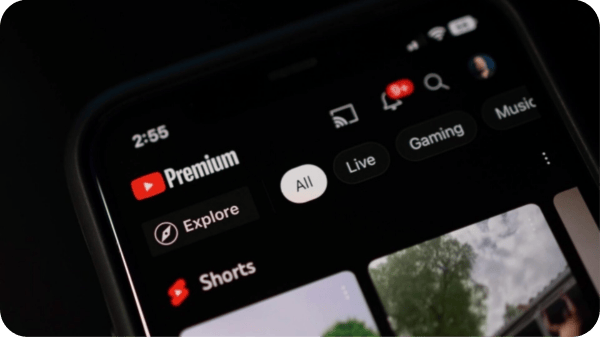
It's Thursday! After hustling through almost a whole workweek, you deserve something nice. Like a new shirt…or a pair of $50,000 Apple sneakers.
SEEING GREEN
YouTube scored $7.7 billion in quarterly ad revenue
Alphabet has once again exceeded Wall Street expectations. In the second quarter of 2023, the parent company of Google and YouTube reported $74.60 billion in revenue and a net income of $18.37 billion. Those better-than-expected results hint at the beginnings of the “dramatic growth” Google CEO Sundar Pichai forecasted earlier this year, when he announced the company’s decision to lay off about 12,000 employees.
YouTube posted encouraging numbers, too.
After reporting declining ad revenue for three quarters straight, YouTube hauled in $7.7 billion in ad revenue during Q2 (a year-over-year increase of about 5%). Those numbers are a positive sight after a downward-trending year—and a good sign that the introduction of YouTube Shorts ads is turning things around for YouTube. Q2 2023 was the first full quarter for both Shorts ads and Primetime Channels. The former feature seems to be off to a good start: during Alphabet’s quarterly call, Pichai noted that YouTube’s TikTok competitor is now watched by two billion logged-in users, up from 1.5 billion a year ago. (YouTube Premium had a productive quarter, too. According to Alphabet exec Ruth Porat, the service experienced “significant subscriber growth,” a trend that contributed to last week’s price hike.)
Q2 was also Neil Mohan’s full full quarter as YouTube’s new CEO.
Susan Wojcicki’s successor began teasing creator-friendly tools within days of taking over, and quickly delivered on those promises. Now, Alphabet will see another high-level promotion: according to Pichai, Porat will progress past her previous CFO role to take on the titles of President and Chief Investment Officer.
HEADLINES IN BRIEF 📰
YouTube has agreed to a deal with Verizon that will offer complimentary NFL Sunday Ticket memberships to new customers who meet certain conditions. (Tubefilter)
Linktree now allows users to link out to their Threads accounts and integrate new Threads posts “directly into their Linktree profile.” (TechCrunch)
X (aka the platform formerly known as Twitter) has reportedly informed advertisers that they’ll need to shell out at least $1,000 per month in order to remain verified. (Engadget)
Sports oriented platform Fanatics has released a livestreaming ecommerce app called Fanatics Live. (TechCrunch)
DATA • STREAMERS ON THE RISE 📈
This streamer’s gaming glow-up helped her discover her passion
Krystalogy has been a creator since she was 13 years old. She started posting Let’s Plays way back in 2012 and was instantly hooked. Within no time, the gamer was uploading videos to YouTube “every single day.” That momentum carried Krysta all the way through high school, by which time she had gained a following of 30,000 subscribers and begun monetizing her content.
Then her first year of college rolled around, and Krysta realized that she was quickly “outgrowing” her audience on YouTube. With so many young viewers, the creator felt tied down to kid-friendly games like Minecraft and The Sims.
So, she rebranded.
With a fresh username and a shiny new Twitch account, Krysta was able to play “more mature games” and lean into her gift for audience engagement—all while escaping the hassle of editing.
“I started to realize I really liked streaming on Twitch because I talk a lot and it’s fun to have people to talk to.”
By 2019, Krysta says, Twitch had “really started to blow up.” The platform’s growth coincided with her graduation—a milestone that gave her the freedom to pursue streaming full-time. Three years later, Krysta now claims nearly 120,000 followers and has launched her own content group, SomeBros, with fellow creators Berleezy, ImDontai, Physical Gamerz, Joeiaco, JoJothaMofo, and RicoTheGiant. That success has been a net positive, but it’s also attracted a fair number of trolls—which is why Krysta’s “number one advice” for young creators comes down to three simple words: “protect your peace.”
ENOUGH SLICES
Can you own a TikTok meme? A new lawsuit aims to answer that question once and for all.
The “enough slices” guy is facing a legal battle. Anthony Fantano (aka the musical critic behind Needle Drop) has been sued by Activision after contesting the publisher’s use of his voice in a promotional TikTok video.
Here’s a quick rundown of the case:
Back in 2021, Fantano reacted to a video of a pizza being cut into increasingly smaller pieces by shouting the phrase “enough slices!” That exclamation has now appeared in thousands of TikTok videos (54,000, according to Rolling Stone), including a clip posted by Activision to promote a pair of Crash Bandicoot-inspired sneakers. According to the publisher, Fantano reached out shortly after that video went live to demand that Activision “either immediately pay him substantial monetary damages” or “be prepared to defend a lawsuit.” The creator purportedly claimed that other companies had already paid up to avoid litigation.
Activision’s response: in its suit, the publisher argues that Fantano knowingly profited off his viral sound by adding it to TikTok’s Audio Library. On that basis, the publisher is seeking a declaratory ruling that would prevent Fantano from suing entities that reuse his viral audio.
It’s not an unprecedented argument.
Courts often defend users who repurpose preexisting content on the basis of fair use. In 2015, for instance, a U.S. appeals court ruled against Universal Music Group in favor of a mother who had used a few seconds of Prince’s “Let’s Go Crazy” in a video featuring her baby.
If Activision’s suit reaches the courts, its sneaker-themed video could theoretically be deemed transformative enough to constitute fair use. Either way, this case has the potential to rewrite the rules of meme ownership altogether—an outcome that could have big consequences for online creators.
WATCH THIS 📺
A former Twitter exec just got really real about Elon Musk’s takeover
Six months ago, former Twitter Blue exec Esther Crawford went viral for sleeping on the floor of a conference room during Elon Musk’s hectic takeover. Now, Crawford has taken to X (aka Twitter) to give users an inside look at the turbulence of that transitionary period.
Her blog post-slash-video explores the company’s stagnation before Musk and the lack of “psychological safety” that employees faced after its sale. Check out Crawford’s post here to read (or watch) the full story.

Was this email forwarded to you? Subscribe here.
Today's newsletter is from: Emily Burton, Sam Gutelle, and Josh Cohen. Drew Baldwin helped edit, too. It's a team effort.





